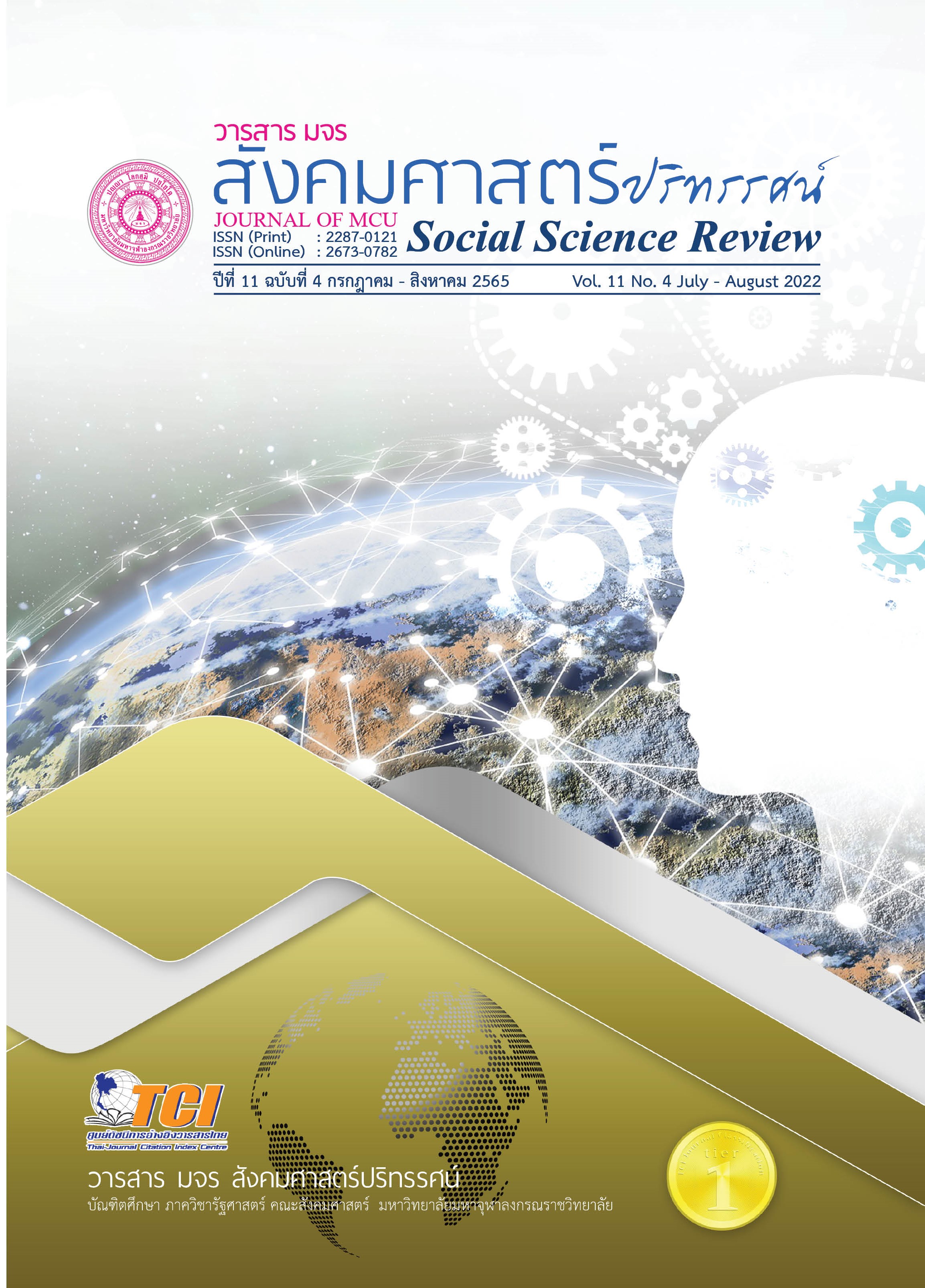มุมมองเชิงอนาคตการจัดการเรียนรู้ตามหลักพระพุทธศาสนา เพื่อส่งเสริมในสังคมวิถีใหม่
คำสำคัญ:
การจัดการเรียนรู้, พระพุทธศาสนา, สังคมวิถีใหม่บทคัดย่อ
การจัดการเรียนรู้ตามหลักพระพุทธศาสนาซึ่งเป็นหนึ่งในสาระการเรียนรู้ของวิชาสังคมศึกษาซึ่งมีความสำคัญอย่างยิ่งต่อการพัฒนาสมรรถนะของผู้เรียน ให้มีความรู้ความสามารถในการดำเนินชีวิตอยู่ในสังคมวิถีใหม่การรู้เท่าทันสื่อ การเปลี่ยนแปลงของสังคมวิถีใหม่ การอยู่รวมกับบุคคลอื่น ๆ ได้อย่างมีความสุขและรวมไปถึงพฤติกรรมของผู้เรียนให้มีคุณธรรมจริยธรรม บทความวิชาการนี้ผู้เขียนได้นำเสนอมุมมองเชิงอนาคตการจัดการเรียนรู้ตามหลักพระพุทธศาสนาเพื่อส่งเสริมในสังคมวิถีใหม่ในด้านดังต่อไปนี้ 1) ด้านมุมมองเชิงอนาคตการจัดการเรียนรู้ตามหลักพระพุทธศาสนา โดยใช้มุมมองเชิงอนาคตคือ อนาคตจากการคาดการณ์ และอนาคตที่มีความเป็นไปได้ในการจัดการเรียนรู้ตามหลักพระพุทธศาสนาคือ การจัดการเรียนรู้แบบไตรสิกขาได้แก่ ศีล สมาธิ ปัญญา 2) ด้านการส่งเสริมหลักธรรมในสังคมวิถีใหม่ (New Normal) โดยใช้หลักธรรมทางพระพุทธศาสนาคือ ปธาน 4 ได้แก่ สังวรปธาน เพียรป้องกัน ปหานปธาน เพียรละทิ้ง ภาวนาปธาน เพียรทำให้มีให้เป็นและอนุรักขปธาน เพียรดูแลรักษาไว้ในสังคมวิถีใหม่
เอกสารอ้างอิง
ทนงศักดิ์ แสงสว่างวัฒนะ. (2563). "New Normal" วิถีชีวิตใหม่และการปรับตัวของคนไทยหลังโควิด-19: การงาน การเรียน และธุรกิจ. วารสารการบริหารการปกครองและนวัตกรรมท้องถิ่น, 4(3), 371-386.
ธัชเฉลิม สุทธิพงษ์ประชา และธันยพร สุนทรธรรม. (2561). คู่มือการมองอนาคต (ฉบับปรับปรุง). กรุงเทพฯ: วิทยาลัยสหวิทยาการ มหาวิทยาลัยธรรมศาสตร์.
ธัญญ์นภัส วิรัตน์เกษม. (2564). การพัฒนารูปแบบการมีส่วนร่วมด้านพฤติกรรมคุณธรรมจริยธรรมในวิถีชีวิตความปกติใหม่ (New Normal) ของนักเรียนโรงเรียนเทศบาลวัดโพธิ์ จังหวัดชลบุรี. วารสารวิชาการวิทยาลัยสันตพล, 7(2), 114-127.
ปราโมทย์ ยอดแก้ว. (2564). การตลาดดิจิทัลกับการเปลี่ยนแปลงวิถีชีวิตใหม่ในสังคมไทย. วารสารสังคมวิจัยและพัฒนา, 3(1), 11-22.
พระครูธรรมคุต สุทฺธิวจโน (สุทธิพจน์). (2564). การดำรงชีวิตวิถีใหม่ตามแนวพระพุทธศาสนา. วารสารศึกษาศาสตร์ มมร, 9(1), 197-209.
พระครูวินัยธรวรรธนา ญาณวโร และคณะ. (2564). การเกษตรเชิงพุทธกับแนวทางการแก้ปัญหาเศรษฐกิจ. วารสารสังคมศาสตร์ปัญญาพัฒน์, 3(1), 37-48.
พระธรรมปิฎก (ป.อ. ปยุตฺโต). (2540). พระพุทธศาสนาพัฒนาคนและสังคม. กรุงเทพฯ: โรงพิมพ์ส่วนท้องถิ่น.
__________ . (2542). การเพิ่มประสิทธิภาพในการทำงาน. กรุงเทพฯ: ธรรมสภา.
__________ . (2542). ทางสายอิสรภาพของการศึกษาไทย. กรุงเทพฯ: มูลนิธิพุทธธรรม.
พระปลัดสถาพร ปุ่มเป้า. (2564). แนวทางการสอนภาษาไทยในชีวิตวิถีใหม่ ท่ามกลางวิกฤตการณ์ COVID-19. วารสารวิชาการร้อยแก่นสาร, 6(8), 388-403.
พระมหาโพธิวงศาจารย์. (2563). วิถีชีวิตใหม่ New Normal. สืบค้น 10 กรกฎาคม 2564, จาก https://siamrath.co.th/n/166631
พระศักดิ์ดา ฉนฺทโก และสมศักดิ์ บุญปู่. (2558). กระบวนการพัฒนาผู้เรียนตามแนวพระพุทธศาสนาในสังคมไทย. วารสารศึกษาศาสตร์มหาวิทยาลัยนเรศวร, 17(3), 144-153.
พหล สง่าเนตร. (2563). การขับเคลื่อนยุทธศาสตร์ชาติสู่ยุค “ฐานวิถีชีวิตใหม่ (New Normal)” ด้วย STAR STEMS. วารสารสถาบันวิชาการป้องกันประเทศ, 11(2), 1-9.
ลัญจกร นิลกาญจน์. (2563). พุทธธรรมวิถีชีวิตใหม่ กับการพัฒนาสุขภาพและเศรษฐกิจชุมชนวัดพรหมโลก อำเภอพรหมคีรี จังหวัดนครศรีธรรมราช. วารสารมนุษยศาสตร์และสังคมศาสตร์ มหาวิทยาลัยราชภัฏสุรินทร์, 22(2), 87-102.
วศิน อินทสระ. (2561). ไตรลักษณ์ (ออนไลน์). สืบค้น 10 กรกฎาคม 2564, จากhttp;//www.jozh.net/index.pho?mo=3 &art=2456056.
วิทิต บัวปรอท. (2564). ทิศ 6 ในพระพุทธศาสนากับการสร้างสัมพันธภาพระหว่างบุคคลในยุควิถีปกติใหม่. วารสารมหาจุฬานาครทรรศน์, 8(6), 208-221.
สิริรัตน์ ช่อฉาย. (2564). ศึกษาพฤติกรรมชีวิตวิถีใหม่ของนักเรียนในช่วงสถานการณ์ COVID-19. วารสารวิชาการมนุษยศาสตร์และสังคมศาสตร์รำไพพรรณี, 2(1), 1-14.
สุพจน์ อิงอาจ. (2564). การจัดการเรียนการสอนออนไลน์ที่ส่งผลต่อการตั้งใจอย่างต่อเนื่องต่อการเรียนในแบบฐานวิถีชีวิตใหม่ของนักศึกษาระดับปริญญาตรี. วารสารบริหารธรุกิจเทคโนโลยีมหานคร, 18(1), 28-45
อรอุมา เจริญสุข. (2553). การตรวจสอบโมเดลอิทธิพลของตัวแปรกำกับที่มีการส่งผ่านของพฤติกรรมจริยธรรมของนักเรียนระดับมัธยมศึกษา. วารสารศึกษาศาสตร์, 21(1), 81-94
อลงกรณ์ เกิดเนตร. (2564). การจัดการชั้นเรียนออนไลน์ด้วยรูปแบบ SMILES เพื่อส่งเสริมการเรียนรู้ชีวิตวิถีใหม่ในยุคเปลี่ยนผ่านการศึกษาด้วยเทคโนโลยีดิจิทัล. วารสารปัญญาภิวัฒน์, 13(1), 294-307.
อุทัย วรเมธีศรีสกุล และคณะ. (2561). พุทธวิธีการเรียนการสอน. วารสารบัณฑิตศึกษามหาจุฬาขอนแก่น, 5(1), 71-81
Hough, B., & Duncan, K. (1970). Teaching description and analysis. Addison-Westlu.
Poddubnaya, T. N. (2021). Distance Learning Experience in the Context of Globalization of Education. Propósitos y Representaciones, 9, 1-7.
ดาวน์โหลด
เผยแพร่แล้ว
รูปแบบการอ้างอิง
ฉบับ
ประเภทบทความ
สัญญาอนุญาต
ลิขสิทธิ์ (c) 2022 วารสาร มจร สังคมศาสตร์ปริทรรศน์

อนุญาตภายใต้เงื่อนไข Creative Commons Attribution-NonCommercial-NoDerivatives 4.0 International License.
เพื่อให้เป็นไปตามกฎหมายลิขสิทธิ์ ผู้นิพนธ์ทุกท่านต้องลงลายมือชื่อในแบบฟอร์มใบมอบลิขสิทธิ์บทความให้แก่วารสารฯ พร้อมกับบทความต้นฉบับที่ได้แก้ไขครั้งสุดท้าย นอกจากนี้ ผู้นิพนธ์ทุกท่านต้องยืนยันว่าบทความต้นฉบับที่ส่งมาตีพิมพ์นั้น ได้ส่งมาตีพิมพ์เฉพาะในวารสาร มจร สังคมศาสตร์ปริทรรศน์ เพียงแห่งเดียวเท่านั้น หากมีการใช้ภาพหรือตารางหรือเนื้อหาอื่นๆ ของผู้นิพนธ์อื่นที่ปรากฏในสิ่งตีพิมพ์อื่นมาแล้ว ผู้นิพนธ์ต้องขออนุญาตเจ้าของลิขสิทธิ์ก่อน พร้อมทั้งแสดงหนังสือที่ได้รับการยินยอมต่อบรรณาธิการ ก่อนที่บทความจะได้รับการตีพิมพ์ หากไม่เป็นไปตามข้อกำหนดเบื้องต้น ทางวารสารจะถอดบทความของท่านออกโดยไม่มีข้อยกเว้นใดๆ ทั้งสิ้น





